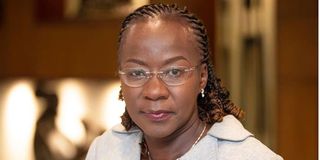On mission to bridge digital divide

What you need to know:
- She is the latest phenomenal woman to rise above the odds to make it to the global employment arena.
Two words define 51-year-old Catherine Adeya: resilience and self-confidence.
She is the latest phenomenal woman to rise above the odds to make it to the global employment arena.
The World Wide Web Foundation on August 3 named Dr Adeya the director of research, “a job I got because of believing in myself and knowing I can do it”.
Of importance was that the job required a candidate with a work permit in the UK and the US, something Dr Adeya lacked.
“I applied and said: ‘okay let them come back and say they couldn’t take me because I don’t have these two items’,” she says.
“And here I am. I am going to work from Nairobi until further notice. I competed with the best in the world and I am honoured to have been picked.”
The position is fruition of things Dr Adeya has worked on and believed in.
Digital split
The job enables her to research on ways to eliminate critical challenges that cause digital split.
“Coronavirus has brought to light the digital divide. There are, for example, pupils and students who can study online and there are others who cannot,” she says.
“It gives me an opportunity to work on what the Web should do and make policy makers understand that it is a public good. It is no longer a luxury. We should be talking about Web for life.”
And bridging the divide is not just about citizens having gadgets that can be connected to the internet.
“It is about being connected meaningfully,” Dr Adeya says.
“If it’s about bundles, how cheap are they? If its internet connection, how reliable is it? There should be subsidised connection.”
Higher learning journey
Dr Adeya, has a master’s degree in Electronic Publishing and Information Development in the Developing World and doctorate in Information and Development from Edinburgh Napier University.
She set off her higher learning journey at Moi University where she was the best undergraduate student in Information Sciences.
Dr Adeya’s passion was to be a lawyer, only for her to be admitted to a course that had just been introduced at the university.
“None of us in the pioneering class even chose the course. My father convinced me to take up the course because he had been informed that IT would be the future,” she says.
Upbringing
Dr Adeya’s upbringing nurtured her ambition. Her father Ambrose Adeya, mother and great grandmother were teachers.
Mr Adeya – now deceased – was Kenya National Union of Teachers secretary general from 1970 to 2001.
“I was taught not to see the empty half of the glass,” she says.
She attributes her success to a pool of mentors and role models, including lecturers and supervisors at undergraduate and graduate level.
“Mentorship and role modelling is very important for women in Science, Technology, Engineering and Mathematics,” she says.
An incident as she undertook her PhD stiffened her resilience. She lost all her thesis work just two days to meeting her supervisor. She had done so much work and had to do it all over again.





